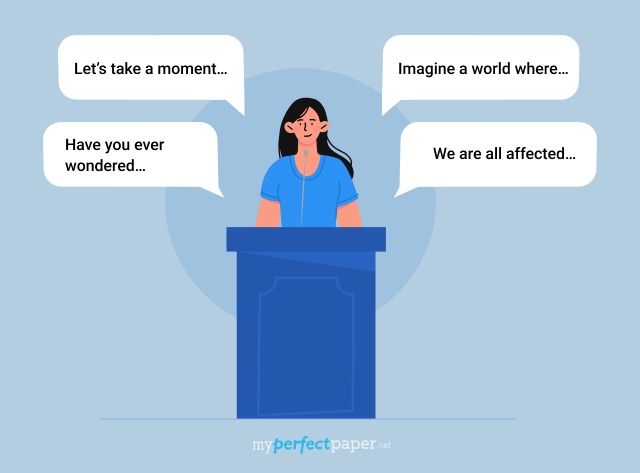How to Structure and Format a Speech for Impact
Writing a speech might seem hard, but it becomes much easier with a good plan. A clear speech format helps organize ideas and makes sure the message is easy to understand. Whether it’s for school, a debate, or a special event, following a few simple steps can make speech writing easier.
Here are four easy steps to create a strong speech format.
Step 1: Start With a Statement of Purpose
A statement of purpose is one or two short sentences that give a clear idea of the speech’s goal. It acts as a roadmap, helping the audience understand what to expect.
How to Write a Strong Statement of Purpose:
- Think about the topic: What is the speech about?
- Decide the purpose: Is the speech meant to inform, persuade, entertain, or inspire?
- Keep it short: One or two sentences are enough.
Here is an example of a statement of purpose to help you understand:
"This speech will explain why mental health is important and how small daily habits can improve well-being."
Step 2: Add a Strong Introduction
The introduction should grab attention and clearly say what the speech is about.
The first few sentences are important. If the start is boring, people may stop listening.
Here is how to start a speech:
- Ask a question, share a fact, or tell a short story.
- Clearly say what the speech is about.
- Give a quick idea of what will be covered.
A good introduction makes people want to hear more.
Step 3: Organize the Body
The body of the speech is the most important part. It should have clear, well-structured paragraphs that support the topic.
How to organize the body:
- Arrange points in order (chronological, problem-solution, cause-effect).
- Support ideas with examples, statistics, or short personal stories.
- Keep sentences short and clear.
- Use transition words (first, next, however) to connect ideas.
Each paragraph for a speech should focus on one key idea and be explained with examples, facts, or personal stories.
Now, let’s break it down further:
Point 1: Introduce the First Key Idea
Start with a clear statement of the first main point. This should be a strong idea that directly supports the speech’s purpose.
- Explain why this point is important and how it relates to the audience.
- Give an example, a fact, or a short personal story to make it more meaningful.
- Use descriptive language to keep the audience interested.
Point 2: Develop the Second Key Idea
After introducing the first point, build on it by adding a second important idea. This should logically connect to the first point and provide more depth or a different perspective.
- Use comparisons, real-life examples, or logical reasoning to strengthen the argument.
- Show how this idea relates to the first one.
- Keep the language simple but impactful.
Point 3: Add the Final Key Idea
If needed, introduce a third supporting point. This could:
- Address a counterargument (if it’s a persuasive speech).
- Present a final important fact that ties everything together.
- Offer a new perspective that strengthens the overall message.
Step 4: End with a Strong Conclusion
The conclusion should be powerful. It should remind people of the key points and leave a strong message.
The last words of a speech matter. A weak ending makes a speech forgettable.
How to end a speech:
- Quickly repeat the main points.
- End with a strong message, call to action or quote.
- Say thank you if needed.
A strong ending helps the audience remember the speech and its message.
Formatting Rules for a Speech
A well-formatted speech looks neat, is easy to follow, and helps the speaker stay on track. Good formatting makes the speech more organized and helps the audience understand the message better. It also makes it easier for the speaker to read and deliver.
Here are some simple rules to follow when formatting a speech:
- Use Clear Headings: Divide the speech into three parts: Introduction, Body, and Conclusion. This keeps it organized.
- Write in Short Paragraphs: Long paragraphs are hard to read. Short ones make the speech clearer.
- Use Bullet Points for Key Ideas: This makes it easier to remember important points while speaking.
- Use Simple and Clear Language: Avoid long or difficult words. The speech should be easy to understand.
- Include Pauses and Breaks: Add spaces or symbols (/, …) to remind where to pause while speaking.
- Write in a Conversational Tone: A speech should sound natural, like talking to an audience, not reading an essay.
- Highlight Important Words: Bold or underline key words to make them stand out.
- Use a Big, Clear Font: This makes it easier to read when speaking from notes.
- Leave Space Between Sections: Extra space between ideas makes the speech easy to follow.
Different Types of Speech Formats With Examples
Different types of speeches have different formats. The format depends on the purpose, audience, and situation. Some speeches share information, while others try to convince or entertain. Knowing these formats makes speech writing and delivery easier.
Here are some common speech formats:
Speech Format Examples for Students
Students often need to write and give speeches for different school levels. Each level may have its own style and requirements.
Here is a list of common speech format for students:
Why is it Important To Create a Speech Format?
Writing a speech without a format is like building a house without a plan. It can fall apart easily. A good speech format helps keep ideas clear and makes sure everything flows smoothly.
Here’s why speech format is important:
- Keeps the Speech Clear: A format helps ideas stay in order so the speech makes sense.
- Makes People Listen: A well-organized speech is easier to follow and keeps the audience interested.
- Helps with Confidence: Knowing what to say and when to say it makes the speaker feel more prepared.
- Makes the Speech Memorable: A clear format helps people remember key points.
In short, using a speech format makes a speech easier to write, deliver, and understand.
Common Mistakes Students Make in Speech Formatting
Many students make mistakes when formatting a speech. These mistakes can make the speech hard to understand and difficult to deliver.
A well-formatted speech in English helps the speaker stay on track and keeps the audience interested.
Here are some common mistakes students make:
- No Clear Introduction or Conclusion: Every speech needs a strong start and a proper ending. Without them, it feels incomplete.
- Writing Long Paragraphs: Long blocks of text are hard to read. Short paragraphs and bullet points make the speech clearer.
- Ideas Are Not Organized: The speech should flow smoothly. If ideas are not in order, it can confuse the audience.
- Using Difficult Words: A speech should sound natural. Simple and clear words make it easy to understand.
- Forgetting to Add Pauses: Pauses help the speaker breathe and give the audience time to understand the message.
- Small or Hard-to-Read Font: A speech should be easy to read. The large and clear text helps the speaker follow along.
- Not Highlighting Important Words: Keywords should stand out so the speaker can emphasize them.
- Writing Like an Essay: A speech should sound like talking, not reading from a book. A natural tone makes it more interesting.
- Not Checking the Time: A speech should fit within the given time. Formatting helps manage time better.
Avoiding these mistakes makes a speech easier to give and more enjoyable for the audience. A good format keeps the speaker confident and helps the message come across clearly.
So there you have it!
A clear speech format makes writing and delivering a speech much easier. It helps speakers stay confident, organized, and clear in their message.
If writing a speech feels difficult, MyPerfectPaper.net can help.
Our paper writing service provides well-structured and original content for any academic need. Whether it’s a speech, an essay, or any other writing task, we offer expert help, on-time delivery, and 100% original work.
So, do you need help? Contact our speech writing service today and make writing stress-free!
















